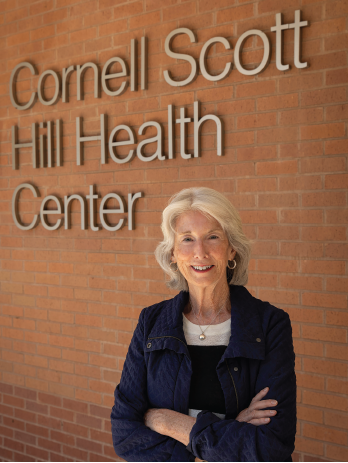‘We are teaching our fellows the ideal way to treat patients given the medical literature & guidelines, & then how to adjust that treatment for patient preferences & comorbidities. But we also have to adjust treatment around a patient’s social situation and the barriers that they’re going to experience when we try to implement the treatment plan.’ —Dr. Buckley
Patients at the health center previously did not have access to a rheumatologist, a critical issue in the New Haven region with its large minority, underinsured population. The clinic now also offers specialty care, including an eye clinic, podiatry, otolaryngology, orthopedics, neurology, gastroenterology, dermatology, urology and gynecology.
“Patients can get services at the clinic without referrals to hospital buildings that might be hard to get to, and without the intimidation of walking into places where you don’t speak the language,” Dr. Buckley says. “Cornell Scott Hill Health Center is a place where people who don’t have cars or transportation can walk or easily take the bus.”
The health center also offers behavioral and mental health services. “When behavioral and mental health issues get in the way of medical care, which they often do, that can be very challenging within an academic health system because we’re so large and complex,” Dr. Buckley adds.
However, there are still significant hurdles in clinical care. Her patients do not necessarily understand the importance of early treatment for rheumatoid arthritis, lupus, and other inflammatory diseases in averting crippling disability, and even death.
Patient Perspective

Lenore Buckley, MD, MPH
Harold Shapiro
Noemi Torres, 42, first received care at Cornell Scott Hill Health Center about 20 years ago when she was pregnant with her first child. Ms. Torres has continued to use the clinic’s services for herself and her children.
“It’s been convenient,” Ms. Torres says. “I can walk in, and they take care of me right away. When I feel sick, I don’t go to the emergency room because that can take up my whole day; I go to the walk-in clinic instead.”
Two years ago, Ms. Torres began to experience pain in her joints. At first, she thought she was tired from working the overnight shift as a custodian, but when the pain worsened, she called the clinic and was seen by Dr. Buckley, who diagnosed Ms. Torres with lupus.
For Ms. Torres, the health center is a place where she has received convenient access to care, including the timely diagnosis of a chronic illness, and an individualized healthcare plan.
Ms. Torres, who has insurance, relies on the clinic for the blood work and prescriptions for the medications she needs to treat her illness. She sees Dr. Buckley for critical follow-up appointments and has managed to keep her disease from flaring.
“I feel fine,” Ms. Torres says, “not 100% good, but I feel better so I can do my work, all my chores, exercise and continue with my life. I understand lupus is a disease I will live with forever, but I appreciate my doctor so much because she is there for me.”
